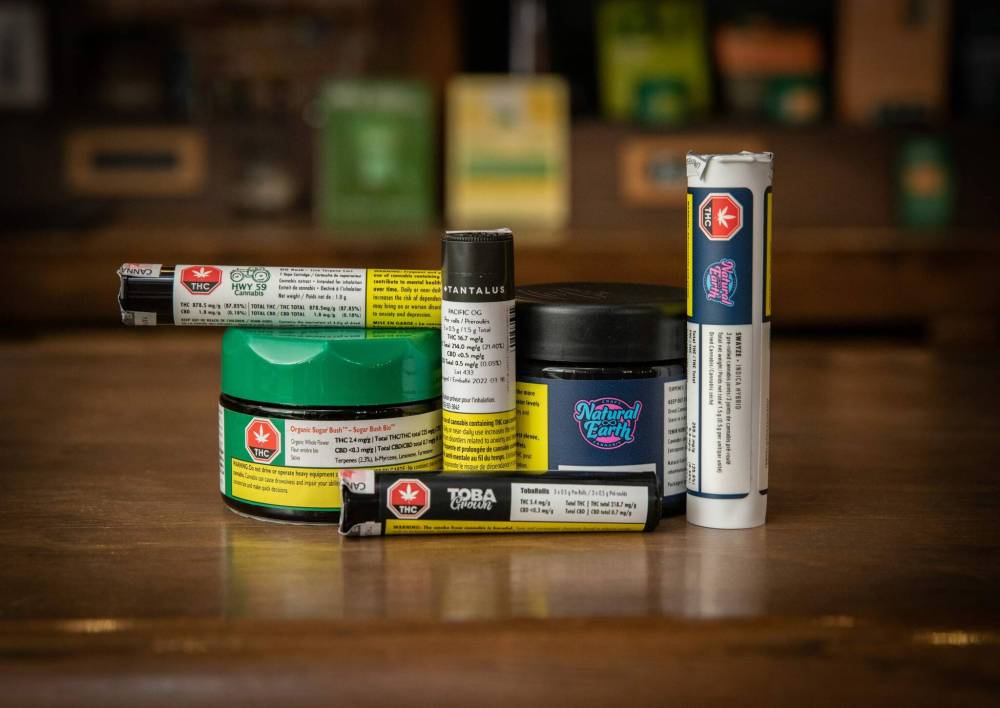Cannabis industry pleased with plan to repeal 6 per cent fee
Advertisement
Read this article for free:
or
Already have an account? Log in here »
To continue reading, please subscribe:
Monthly Digital Subscription
$19 $0 for the first 4 weeks*
- Enjoy unlimited reading on winnipegfreepress.com
- Read the E-Edition, our digital replica newspaper
- Access News Break, our award-winning app
- Play interactive puzzles
*No charge for 4 weeks then billed as $19 every four weeks (new subscribers and qualified returning subscribers only). Cancel anytime.
Read unlimited articles for free today:
or
Already have an account? Log in here »
Hey there, time traveller!
This article was published 29/11/2022 (513 days ago), so information in it may no longer be current.
The Manitoba government has introduced legislation to repeal the six per cent social responsibility fee on the sale of cannabis.
While retailers expressed happiness about the news that starting in the new year they will not have to collect that fee on every sale, it likely does not mean that the cost will be entirely removed from the system.
Instead, Finance Minister Cameron Friesen said the province has re-commenced conversations with the federal government to re-engage with the federal excise tax regime, something the province opted out of when cannabis was legalized in 2018.

The province has been collecting about $10 million per year on the social responsibility fee, which was supposed to contribute to cannabis education and harm reduction. (Jessica Lee / Winnipeg Free Press files)
The province has been collecting about $10 million per year on the social responsibility fee (SRF) that was supposed to be a fee for retailers to contribute to education and harm reduction that might arise from the legal consumption of cannabis.
The SRF was also imposed in lieu of charging PST on cannabis and put in place to help fund regulatory efforts to eliminate the black market sale of cannabis.
One of the reasons for ending the SRF now is that evidence shows legal sales now represent about 50 per cent of total cannabis sales, with the black market still retaining 50 per cent, Friesen said.
Annick Beauchesne, co-owner of Babette Cannabis, a small independent cannabis store in St. James, said she was happy to hear the news.
“It will really make a difference for us,” she said,
But she wondered what the imposition of an excise tax will mean.
“If that is suddenly a burden that the producers have to face then that cost, however you want to paint it, ends up coming around to the consumer anyway,” she said.
And in fact, it could be an even larger burden on the consumer.
Currently, the excise tax is $1 per gram. The province collects the federal government’s 25 per cent share but not the 75 per cent share all other provinces collect.
John Arbuthnot, president and CEO of Delta 9 Cannabis, whose operations represent about 20 per cent of the Manitoba cannabis market, said every province has a different tax structure.
When the excise tax was first implemented, wholesale prices were around $10 per gram making it a 10 per cent tax. But in Delta 9’s last quarter its average wholesale price was about $2 per gram.
“For most producers that excise tax structure is entirely unmanageable,” Arbuthnot said. “If there is a form of relief that our province can come up with for retailers that is very welcome. Now they have to take their next step and replace the cannabis excise tax for this industry to have a shot at long-term sustainable profitability.”
George Smitherman, president and CEO of the Canadian Cannabis Council, echoed that sentiment and is already lobbying the federal government to revise the excise tax to 10 per cent of the purchase price.
“I think the Manitoba government is realizing that it is leaving money on the table,” Smitherman said when asked why he thought the Manitoba government was repealing the SRF
“I would say we are not looking to massively increase the payments that retailers would make. We know business needs predictability and certainty,” Friesen stated.
But it is clear that the province is not unilaterally forgoing $10 million in revenue without replacing it.
The province originally went with the SRF because it did not know what the impact of legal cannabis sales would be, Friesen said.
Now four years in, there is more certainty about that.
However the industry itself is having a hard time making a profitable business case. Manitoba went from an original 30 licensed retailers to 160 in about two years. Some are being forced to close and many operate on very low margins.
The federal government has just launched a review of the Cannabis Act – one year later than it said it would — and Smitherman said the excise tax is one of the issues that needs to be addressed.
Friesen would not comment on whether or not the repeal of the SRF has anything to do with outstanding litigation launched by Long Plain First Nation regarding the constitutionality of the province levying that fee on First Nation-owned stores on reserve.
“We are proud that there is more First Nation participation in the industry than in any other province. We want to have that conversation with Indigenous groups about what retailing looks like and how Indigenous groups can be part of the success stories seen in Manitoba,” he said.
martin.cash@freepress.mb.ca

Martin Cash
Reporter
Martin Cash has been writing a column and business news at the Free Press since 1989. Over those years he’s written through a number of business cycles and the rise and fall (and rise) in fortunes of many local businesses.




